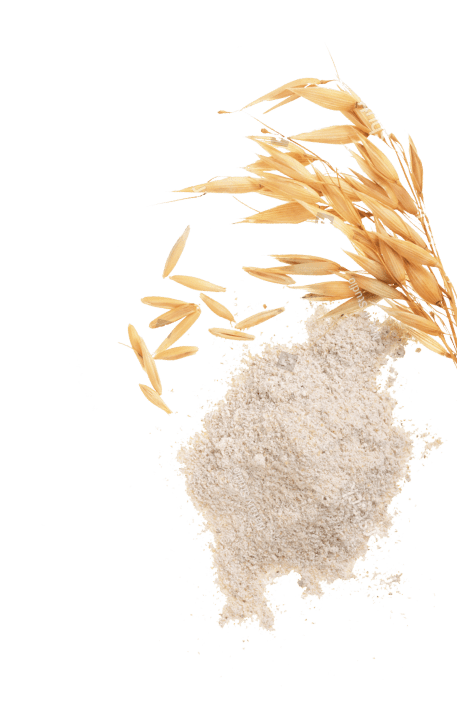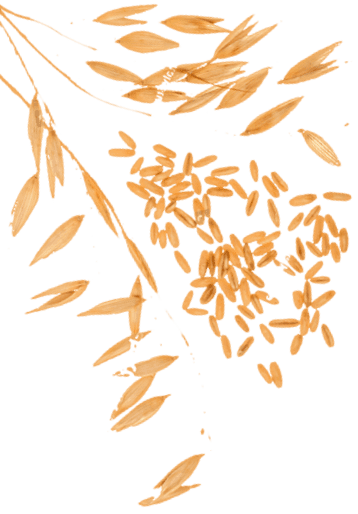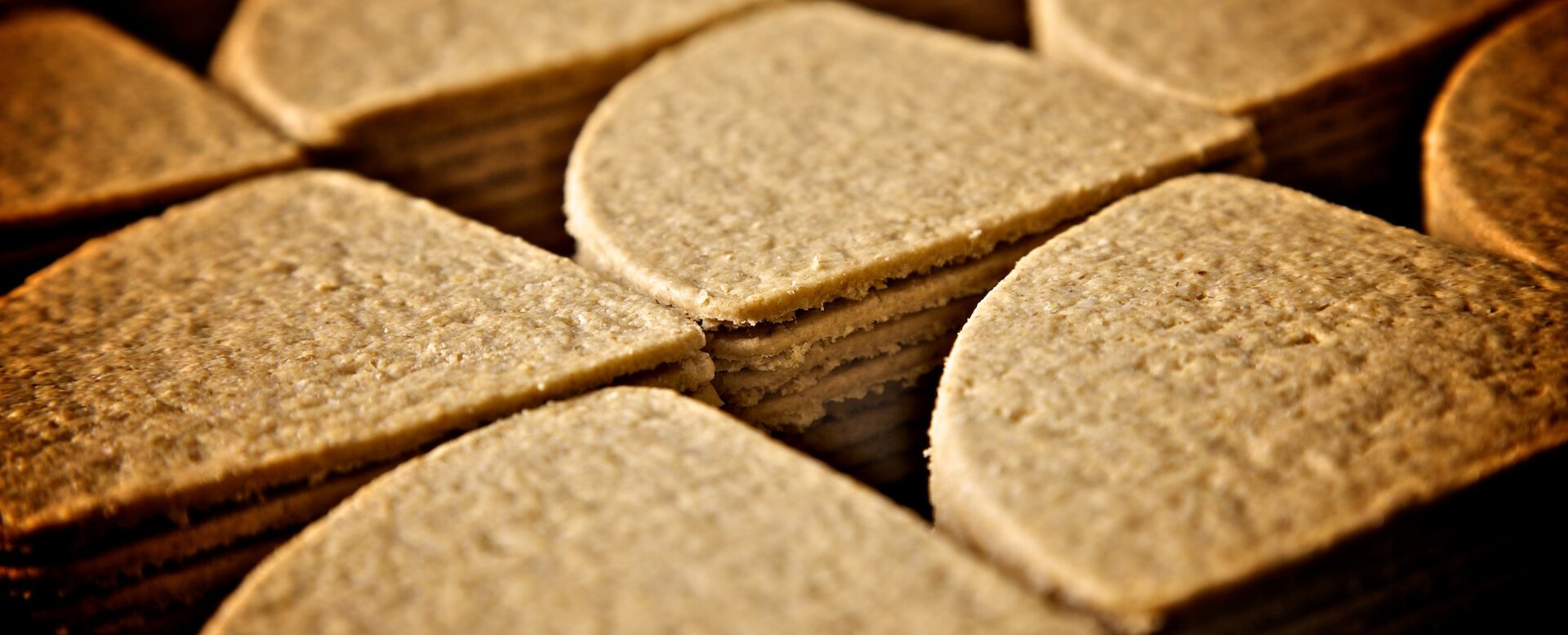No. All our oatcakes contain some wheat so are not wheat free or gluten free.
FAQ

- Are your products wheat free / gluten free?
- Are your products suitable for vegans?
 All our oatcakes are suitable for vegetarians
All our oatcakes are suitable for vegetarians Our oatcakes without cheese are vegan approved -Orkney Thick, Orkney Thin, Orkney Beremeal, Mini Original, Mini Cracked Black Pepper, Orkney Heritage Spelt Wheat, Herb & Pepper
Our oatcakes without cheese are vegan approved -Orkney Thick, Orkney Thin, Orkney Beremeal, Mini Original, Mini Cracked Black Pepper, Orkney Heritage Spelt Wheat, Herb & Pepper - What are the benefits of oats?
Oats are considered to be a superfood due to their numerous health benefits. As a high fibre, low GI wholegrain they work to slow your digestion and help to keep you feeling fuller for longer. This in turn can curb your cravings and promote weight loss.
They are a good source of quality protein which is higher than most other grains, rich in vitamins and minerals and are recognised as a good source of energy to keep you going throughout the day. In addition, beta glutens contained in oats are believed to stimulate the immune system and have a proven effect in lowering cholesterol and preventing heart disease.
For more detail, please refer to:
- Commission Regulation (EU) No 1160/2011 on the authorisation and refusal of authorisation of certain health claims made on foods and referring to the reduction of disease risk
- Commission Regulation (EU) No 432/2012 establishing a list of permitted health claims made on foods, other than those referring to the reduction of disease risk and to children’s development and health
- Regulation (EC) No 1924/2006 of the European Parliament and of the Council on nutrition and health claims made on foods
- Is bere barley (beremeal) an ancient grain ?
Bere barley is an ancient six-rowed native grain that is still grown in the north of Scotland. Bere can be traced back to being used in Orkney more than 4,000 years ago and is well adapted to the Islands growing conditions through its rapid spring growth, short growing season, and tolerance to acid soils. It is commonly referred to as 90-day barley as it is sown later and harvested earlier than other crops.
The arrival of modern higher-yielding barleys in the 19th century led to the general decline in its use however a key factor for its survival on Orkney has been the Barony Mill, Birsay. This traditional water powered mill, which dates back to 1873, continues to grow, mill and sell the ‘meal’.
Beremeal is a cream-coloured flour with a distinctive, earthy, nutty flavour and wholesome appearance, traditionally used to make bere bannocks – round flat scones. Being very proud of our Orkney heritage we wanted to develop a new product with an ingredient sourced from the Islands so beremeal was a natural choice. Working with Queen Margaret University's (QMU) Scottish Centre for Food Development and Innovation, we developed an oatcake which as well as having a unique taste and flavour, has a high fibre content and contains multi nutrients including folate (vitamin B12), thiamine (vitamin B1), iron, phosphorous, magnesium and iodine.
For more details about bere barley please refer to:
- UHI Research (2009): New markets and supply chains for Scottish Bere barley (Martin, Peter; Wishart, John; Cromarty, Arthur; Chang, Xianmin)
- Theobald et al, (2006): The nutritional properties of flours derived from Orkney grown bere barley
- Where can I buy your oatcakes locally?
- Look out for our products in a variety of farm shops, cheese merchants, delis, convenience stores and supermarkets across the UK
- Orkney Thick & Thin are sold in many Scottish Asda, Co-op, Morrisons, Sainsbury's, Tesco and Waitrose stores. Across the rest of the UK, you should find either one or both in selected Asda, Booths, Tesco and Waitrose stores
- If you live in the USA you can buy our oatcakes on Amazon.com or The Scottish Grocer https://www.thescottishgrocer.com/pages/oatmeal-and-oatcakes
- Are any of your products considered to be sugar free?
All our products contain a low level of naturally produced sugar that comes from other ingredients such as the wholegrain oats.
Our Orkney Thin is the only oatcake that contains 'no added sugar' in the recipe of ingredients. The rest of the range have a small quantity of sugar added.
- How recyclable is your packaging?
The packaging we use in all our products is very important to prevent food waste, guarantee our high-quality standards and inform our consumers.
We optimise the weight and volume of our packaging, minimise the amount of packaging used, support initiatives to recycle and use recycled and ethically sourced materials where possible eg FSC cases, PET 1 recyclable skillets and our tins can be reused or recycled.
The film that we use is OPP (Oriented Polypropylene), similar to many other food manufacturers as it is versatile and helps to prolong shelf life and reduce food waste. In the UK, you can recycle our film with carrier bags at special collection points found in larger retail stores.
- Why do we source 100% certified sustainable Palm Oil?
All the oil that we source is non-hydrogenated, suitable for vegans, is either pure rapeseed oil or a blend of 100% RSPO certified sustainable segregated palm oil and rapeseed oil.
Stockan’s (through its parent company Tod's of Orkney Ltd) is a member of the Roundtable on Sustainable Palm Oil (RSPO) and only use 100% certified segregated palm oil that is fully traceable to farming enterprises that follow good practices. Our entire supply chain is subject to an annual independent 3rd party audit and our position is supported by the Orangutan Land Trust, one of the key conservation charities working to protect tropical rainforest habitats and their inhabitants, as well as Act for Wildlife Chester Zoo.
The use of palm oil is a serious issue and one that we have thoroughly considered and researched. The blend we bake with was chosen because it has preservative qualities, is resistant to heat, is solid at room temperature, commercially viable and is widely used in baking. For many years conservationists have been working behind the scenes with key partners to help drive up standards of sustainable palm oil and the industry is regulated by the RSPO.


